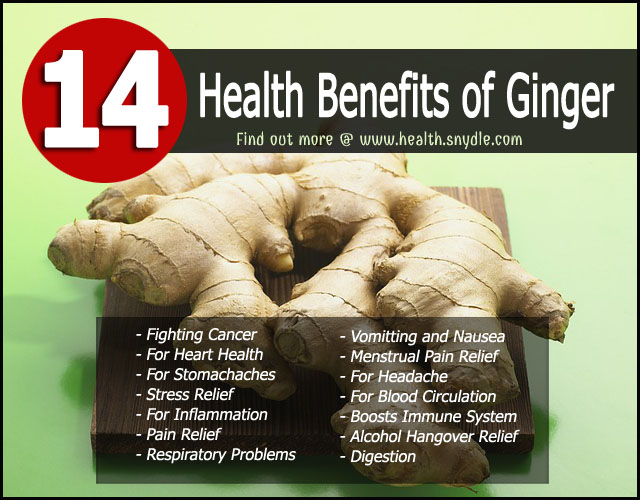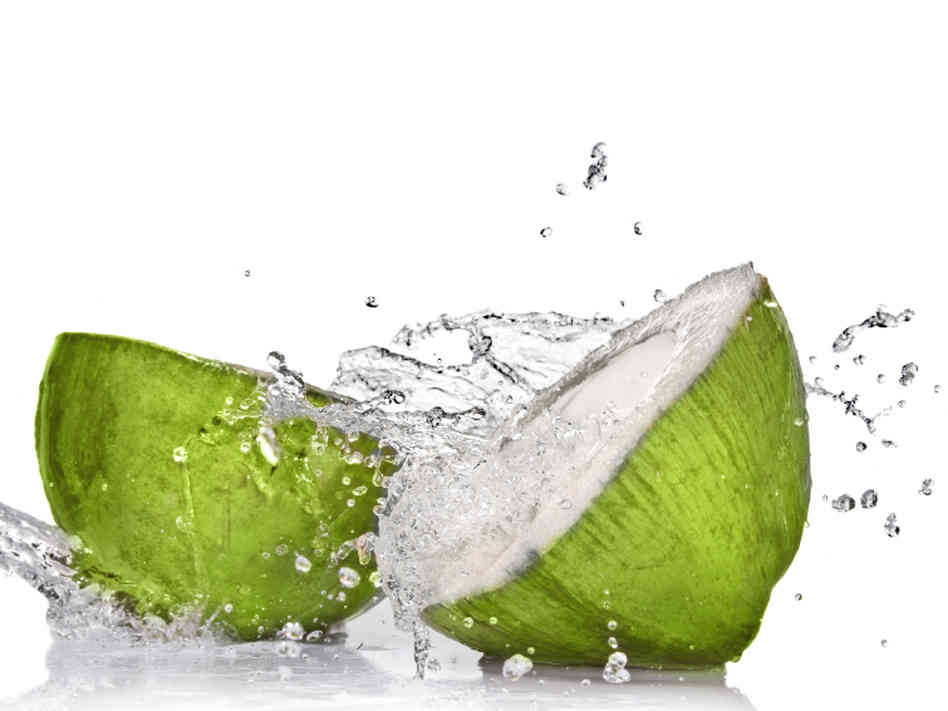14 Reasons Why You Need Ginger
Ginger is a rhizome, commonly used as a spice in Indian cuisine. This herb belongs to the Zingiberaceae family, its scientific name being Zingiber officinale. It is believed to have been originated in South East Asia from where it spread across Asia and other tropical regions. It has been used since time immemorial in Indian and Chinese culture to treat numerous ailments due to its analgesic, anti-inflammatory and anti-emetic properties.
Nutritional Value of Ginger
Ginger root composes of many essential vitamins and minerals like pyridoxine, pantothenic acid, vitamin C, calcium, phosphorus, copper, potassium, manganese and magnesium. It also contains beneficial oils like gingerol, cineol, citral, shogaol, zingerone and farnesene. The herb contains only 80 calories per 100 grams and absolutely no cholesterol.
| Principle | Nutrient Value | Percentage of RDA |
|---|---|---|
| Energy | 80 Kcal | 4% |
| Carbohydrates | 17.77 g | 13.5% |
| Protein | 1.82 g | 3% |
| Total Fat | 0.75 g | 3% |
| Cholesterol | 0 mg | 0% |
| Dietary Fiber | 2.0 g | 5% |
| Vitamins | ||
| Folates | 11 µg | 3% |
| Niacin | 0.750 mg | 4.5% |
| Pantothenic acid | 0.203 mg | 4% |
| Pyridoxine | 0.160 mg | 12% |
| Vitamin A | 0 IU | 0% |
| Vitamin C | 5 mg | 8% |
| Vitamin E | 0.26 mg | 1.5% |
| Vitamin K | 0.1 µg | 0% |
| Electrolytes | ||
| Sodium | 13 mg | 1% |
| Potassium | 415 mg | 9% |
| Minerals | ||
| Calcium | 16 mg | 1.6% |
| Copper | 0.226 mg | 25% |
| Iron | 0.60 mg | 7.5% |
| Magnesium | 43 mg | 11% |
| Manganese | 0.229 mg | 10% |
| Phosphorus | 34 mg | 5% |
| Zinc | 0.34 mg | 3% |
Health Benefits of Ginger
The healing properties of ginger come from its volatile oil called gingerol that is responsible for its strong taste and aroma. The enzyme present in this rhizome helps to decrease inflammation, pain and swelling. It is also known to increase the body’s metabolic rate and promote energy circulation in the body. These are few of the many benefits of ginger. Read on further to know about the benefits of ginger in detail.
1. Cancer
Ginger is a powerful weapon against cancer. The antioxidant present in ginger induces apoptosis and suppresses the free radical damage in the body, reducing the possibility of cancer. A research at the University of Minnesota has found that ginger may slow the growth of colorectal cancer cells. Ginger powder also induces cell death in the ovarian cancer cells.
2. Heart Health
The potassium present in ginger helps to control the heart rate and blood pressure. A study has reported than ginger extract is much more effective than prazosin hydrochloride in reducing the blood pressure. Consuming 1 inch of ginger daily can prevent the risk of stroke by preventing the fatty deposits in the arteries. Studies have shown that taking 1 gram of ginger capsule three times a day for 45 days can lower the triglyceride and cholesterol levels in people with high low-density lipoprotein.
3. Stress
Ginger tea has excellent calming properties and can help you get rid of stress and tension from your daily life. It has a strong aroma that totally uplifts the mood, relieving anxiety.
4. Inflammation
Ginger’s ability to combat serious diseases is due to its effect on excessive inflammation, an underlying cause of many serious illnesses. It inhibits cyclooxygenase (COX) and 5-lipoxygenase (LOX), two important enzymes that play a major role in inflammation. It is much more useful than anti-inflammatory drugs, which can only block COX, but do not affect LOX at all. Unlike the anti-inflammatory drugs, ginger does not cause any side effects like ulcer and stomach problems and irritation. It protects and heals the gut instead.
5. Stomach Problems
Ginger is used to treat various types of stomach disorders like motion sickness, colic, upset stomach, nausea, diarrhea vomiting and loss of appetite. Eating fresh ginger before every meal gets the digestive juices moving, thereby increasing appetite.
6. Pain Relief
Ginger is believed to be the natural painkiller. It is very beneficial in relieving pain from muscle soreness and arthritis, menstrual pain, stomach pain and chest pain. Apply a few drops of ginger oil on the affected areas for instant relief. The patients are advised to consume 250 milligrams of ginger extract daily to reduce the arthritis pain. You can also add a few drops of ginger oil to your bathing water to relieve muscle and joint ache.
7. Respiratory Issues
The antihistamine properties of ginger can help treat respiratory disorders and allergies. It inhibits airway contraction and stimulates the secretion of mucous; preventing the blockage of the respiratory tract. This natural expectorant breaks down and removes mucus, thereby loosening phlegm. It clears the microcirculatory channels of the body, treating sinuses. This makes ginger highly effective for treating cough and persistent sore throat. Take one teaspoon of ginger juice with 1 teaspoon of honey three times a day for relief.
8. Nausea and Vomiting
Several studies have proven that chewing 1 gram of ginger an hour before the surgery can treat the sensation of nausea following an operation. In addition, applying ginger oil to the patient’s wrist can prevent nausea in about 80% patients. Drinking a cup of ginger tea before heading for a flight can prevent airsickness. Ginger tea can also prevent morning sickness in women. However, it is advisable for the pregnant women to consult their doctor before taking ginger. Toss the ginger with honey to make it more palatable.
9. Digestion
Ginger improves the absorption and assimilation of nutrients in the body, thereby improving digestion. It helps to break down the protein in the food. It also protects the stomach from ulcer by promoting mucous secretion. The carminative property of ginger provides relief from gastritis and bloating. It also helps to reduce flatulence. Take ginger tea with honey three times a day to treat indigestion problems.
10. Menstrual Pain
Consuming ginger at the beginning of the menstrual cycle can reduce the pain and cramps that accompany it. A study has shown that taking ginger extract four times daily for 3 days at the beginning of the menstrual cycle could reduce aches in around 62% of women. It has proven to be as effective as ibuprofen and aspirin, potent painkillers. Soak a towel in warm ginger tea and keep it on the lower abdomen. This will relieve the pain and relax the muscles.
11. Headache
Applying ginger paste on the forehead can provide relief from migraine. It is as effective as sumatripatan (a medicine), in treating migraine symptoms. Ginger inhibits the prostaglandin synthesis, which helps to relieve pain and inflammation in the blood vessels.
12. Alcohol Hangover
Studies have shown that taking a combination of ginger with the pith of tangerine and brown sugar before drinking can decrease the symptoms of alcohol hangovers like diarrhea, vomiting and nausea.
13. Blood Circulation
Ginger contains magnesium, zinc and chromium that help to improve the blood flow and prevent excessive sweat and cardiovascular problems.
14. Immune System
Ginger is also beneficial for improving the immune system. It promotes healthy sweating that assists during colds and flu. A good sweat assists in detoxification. Healthy sweat contains germ-fighting agents help to stave off several infections. It also decreases bacterial infections, thereby preventing the onset of diseases.
Side Effects of Ginger
Ginger is quite safe for consumption, but can have some mild side effects on over consumption.
Some minor side effects include:
- Heartburn
- Diarrhea
- Stomach discomfort
- Excess bleeding during menstrual
- Ginger may interact with some prescription medicines
Safety Profile
- Ginger stimulates the release of bile secretion, hence should be avoided by people suffering from gallstones.
- Herbalists are of the view that you should not take more than 4 grams of ginger a single day.
- Children under the age of two should not consume ginger.
- Make sure you consult your health expert before taking ginger supplements.
- Avoid taking ginger supplements if you suffer from bleeding disorder, especially if you are taking blood thinners.
- Pregnant and lactating women are advised to speak to their doctor before taking ginger. It has been reported that excess ginger consumption can affect the fetal’s sex hormones. There is also a report of miscarriage during the 12th week of pregnancy in a woman who consumed ginger for morning sickness. It is advised to avoid eating ginger close to the delivery date as it may increase the risk of bleeding.
- Diabetics should go easy on ginger consumption as it can drastically lower the blood sugar level.
- High doses of ginger can also worsen the heart condition.
How to Use Ginger
Ginger can be brought in the form of oil, tincture and extract. Take at least 2000 milligrams of ginger three times a day with or without food. Make sure the powder is not kept open for too long as it can negate the benefits.
How to Make Ginger Tea
To make ginger tea, cut two inches of ginger root into slices and simmer in one cup of water for about 10 minutes. Cover the pot to retain its volatile constituents as much as possible. When the tea is done, strain it and sip it before every meal. Once prepared, you can add honey, lemon or peppermint to enhance its taste. You can also eat the boiled ginger slices. You should aim to drink at least 3 cups of tea per day.
Storage
Fresh ginger rhizomes should always be stored in a cool and dry place. Use ginger within 3 weeks for optimal benefits. Ginger supplements like capsule and powder should be kept away from heat and light.




